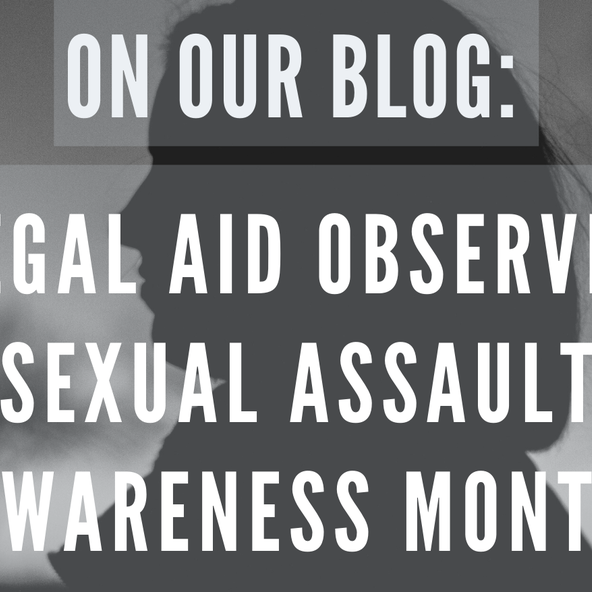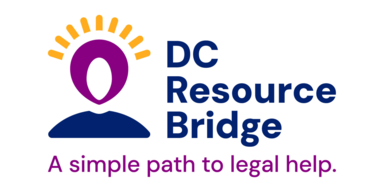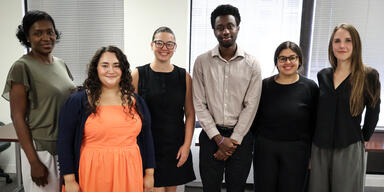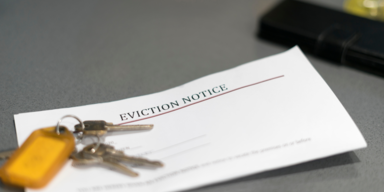
Sexual Assault Awareness Month (SAAM) is an annual movement aimed at raising awareness of and ending sexual assault. It is also a time to reflect on the people who experience sexual assault and harassment each day. Legal Aid stands with sexual assault survivors in our D.C. community, and everywhere.
Fierce activism led by people like Tarana Burke, founder of the Me Too movement, Laura Bates, feminist author and creator of the Everyday Sexism Project, and everyday people standing up against sexism, are furthering sexual assault awareness each day. On February 1, 2019, Tarana Burke and Laura Bates were featured in an episode of TED Radio Hour’s podcast titled “Gender, Power, and Fairness.” The episode discusses the ongoing normalization of everyday sexual harassment. Importantly noted is the implication that this normalization has affected what society, and even the law, understands to be sexual harassment. The Me Too movement is largely credited with the growing recognition of these everyday occurrences and has been key in empowering people of all genders to call out sexual harassment in their lives.
Verbal and street harassment, like catcalling, are examples of common nuisances that can actually be forms of sexual harassment. While all genders suffer street harassment, it disproportionately affects women, with “almost 1 in 4 women [reporting that they] had experienced street harassment by age 12 (7th grade) and nearly 90% by age 19.” On the podcast, Bates points out that when this occurs, women typically hunch their shoulders and just continue walking, perhaps quickening their pace a little. This is something women have come to expect when walking on the street. They are taught that it is normal, and they should get used to it. Even when it occurs on a busy street with other pedestrians, it is rare for bystanders to intervene.
In certain cases, verbal harassment can escalate to assault. A Legal Aid client was a victim of ongoing verbal harassment by a security guard that worked at the building she cleaned. The security guard would say hateful things regarding her limited English proficiency, such as telling her that she “should go home” to her country if she cannot speak English. The harassment was consistent, and the client’s supervisor told her to not pay the security guard any attention. This only worked for so long until the security guard cornered her in a restroom she was cleaning and sexually assaulted her. Legal Aid was able to advise this client on obtaining a Civil Protection Order (CPO), and found her pro bono counsel. The instinct to brush this sort of normalized behavior under the rug meant this situation escalated far further than it should have.
At Legal Aid, our clients often come to us with another form of sexual harassment: groping. Groping falls under D.C.’s definition of sexual contact: “the touching with any clothed or unclothed body part or any object, either directly or through the clothing, of the genitalia, anus, groin, breast, inner thigh, or buttocks of any person with an intent to abuse, humiliate, harass, degrade, or arouse or gratify the sexual desire of any person.” D.C. Code § 22-3006 makes unwanted sexual contact a crime.
Though groping is legally considered sexual assault, it is often not thought of as such. This is especially true when it occurs between two people who once were, or are, in a relationship. Bates wrote in one article that the reluctance to call groping sexual assault is “an attempt to avoid the reality of what happens to girls and women on a regular basis.” Nonetheless, the lived experiences of our clients show the seriousness of these crimes.
In one case, a Legal Aid client was a victim of groping by her ex-partner, who would tell the client that parts of her body belonged to him. They had two children together and, when he would come to pick up the kids to take them to school, he would grab her around the waist, and grab her butt and chest area. He would say things like “you ain't with no other man, because all of this is mine no matter what.” He used the children as leverage, threatening to take them away from her if she attempted to resist him or if she threatened to file a CPO. Legal Aid was able to advise her on her rights and protections and assist her with filing for a CPO to get her closer to protection from her abuser.
In the podcast mentioned above, Burke emphasizes: “People need to be called out for their behavior, but beyond that, their behavior doesn’t happen in a vacuum. It happens in the context of a society that creates space for that kind of behavior.” It is imperative that we take sexual assault and harassment seriously and work toward interrupting these norms.
Legal Aid provides advocacy and protections to our clients who experience this normalized harassment, as well as other forms of sexual harassment. Through our support of domestic violence survivors, our advocacy in expanding protections in the District of Columbia, and our ongoing efforts to call out everyday sexism, Legal Aid is fighting this battle alongside survivors.
Get Help 24/7 from the National Sexual Violence Hotline at 1-800-656-4673.




